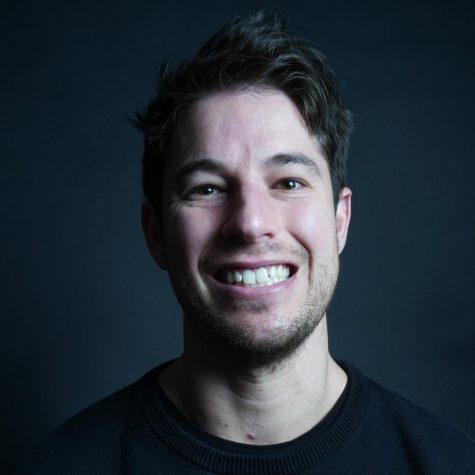Laying the Foundation
This podcast was created to accompany the story “Laying the Foundation” by David Blakeley.
Podcast Transcript
David Blakeley: Today we are going to be talking with a Latino SF State alum who broke into the typically white-dominated field of engineering. He’s worked as an engineer at Boeing for over four years now and we’re going to hear a little bit about what his job entails.
My name is David Blakeley, and welcome to The Bleed.
Today I’m talking with Marcus Mejia, an SF State engineering grad who works at Boeing.
Marcus Mejia: This is Marcus Mejia. I’m an SF State graduate in mechanical engineering. I actually graduated back in 2018 and since I graduated… shortly after I graduated, I had started working for the Boeing Company in Southern California. So, I actually work at the Seal Beach branch, which specializes in customer support. So, the customer support base for all of Boeing, or at least in for, for the United States, is located in Seal Beach. So that’s where I work. My role at Boeing, since I got hired on—I’ve been in the same role for about four and a half to five years now—is a customer support engineer, specializing in retrofit. So, post-delivery, after airplanes have delivered to our airline customers, our team is responsible for releasing service bulletins, which provide the modification instructions to retrofit an airplane. Whether it would be a standard issue service bulletin, or an AD-related service bulletin that’s mandated by the FAA. We’re responsible for compiling all that information from our technical side at Boeing and sending those bulletins through a series of reviews and checks before it actually gets released in the finished product, and before it gets in the hands of the customer.
David: Aerospace engineering is a highly specialized field but like all engineering it’s largely caucasian.
Marcus: I am a Hispanic male. I would say I’m a second generation Hispanic, so in my family, my parents, they were born and raised here in the States in Southern California. But my grandparents, both on my mom and my dad’s side, are from Mexico. They came here, I think in their teens, and they basically just built a life for themselves here. So, my grandparents, even my parents themselves, they never went to college, they never had the opportunities, I guess, at that time to pursue a bachelor’s degree. So, as I was growing upland I realized that—well my parents told me— they saw potential in me and were hoping that one day I’d make that decision to extend my education and go into college. I made that decision in high school that I wanted to pursue engineering, mainly because I liked math. I think math was my favorite subject growing up and I wanted to pursue a field where solving problems was kind of a day-to-day activity. So, I knew engineering was definitely the right field for me. And I quickly learned once I was a student at SF State that I definitely picked the right field. It was definitely a challenge. Being a Hispanic male at SF State, so one thing I noticed, right, was that I was away from home, and that was a big challenge but also noticing that the demographic of folks that went to the school, there was a pretty decent population of Hispanics. And I guess what you could say is, at least for myself, as I definitely had a chip on my shoulder, knowing that I was the first of my family to go to college and to try to get my Bachelor’s. So that was pretty cool.
David: While there is a 22% enrollment rate of LatinX students at SF State in engineering, the professional-STEM field has a LatinX rate of 5%.
Marcus: Once I graduated, like I said, I started working at Boeing and I can say that, being a Hispanic male at Boeing, you can tell as soon as you kind of walk the office floor where I work, you have a good feel for how many different demographics of folks there are. I’d say for Hispanics, I would say we’re probably about 15 to 20% in the office. Of course you have Caucasians and African Americans and Asian ethnicities as well. But what I will say is that the reason why I think it’s beneficial to me, right, being Hispanic is that it kind of even, not just for myself, but for other folks as well who come from a different background who are not Hispanic, I think it’s good to have diversity in the workplace, and even in school because the fact is that because you do come from a different background compared to other folks, you have a voice that may be different than the person sitting right next to you, which is I think a huge factor. You know having these different opinions and ideas will encourage, right, creativity and ultimately, I mean at least in the aerospace industry, that’s huge, right? Having different opinions and different backgrounds, different stories will ultimately I think, in the end, that it does produce a better product. Whether it’s service bulletin base, or even all the way up to building airplanes, actually supporting these airplanes, it does play a factor. So yeah, that’s my take on it.
David: My name is David Blakeley, and you’ve been listening to The Bleed, an Xpress podcast. Thank you for listening.

David Blakeley (he/him) is a senior reporter for Xpress Magazine. He is majoring in journalism and minoring in labor studies. He was born in Orange County,...

